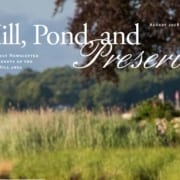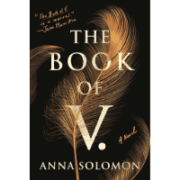Thinking about Adam, Eve, and the Garden

As I’ve traveled from place to place over the past seven months talking about EDEN, it has been revelatory that many readers do not connect my novel with the metaphor of the Garden of Eden. I would have thought the book’s title would be the first giveaway. This is less a commentary about people’s comfort with biblical references, than a testament to the fact that Eden has become a common term in our society’s vernacular. It stands on its own, independent from the Bible as a synonym for paradise.
In late October, I attended the Boston Book Festival as both a presenter and an interested member of the audience. My husband and I attended a fascinating discussion with Stephen Greenblatt, author of the recent book The Rise and Fall of Adam and Eve. In his wonderful and scholarly book, Greenblatt examines the story through history’s eyes: from the point of view of scholars, and artists, and poets and questions what it is about the story of the Garden of Eden that proves it to be “so durable, so widespread, and so insistently, [and] hauntingly real.” From examinations of Durer’s art to Milton’s most famous work, it is a sensational book, which I recommend highly.
The story of Adam and Eve certainly shaped society’s concept of marriage: A man shall leave his father and mother and shall cleave unto his wife: and they shall be one flesh…. an ideal concept at that. The story goes on to provide imagery for what is good and what is evil. It gives us the first documentation of sin. It provides fodder for the characterization of women as manipulative and conniving, and for men as laborers and providers. I would challenge someone to come up with a story that is as impactful as this one on how society defines our most fundamental relationships.
Its structure is ingrained in us, an archetype. There is a man and a woman. They are placed in a paradise. There is temptation. They want more. There is a decline and an expulsion. They go on.
I recently read Crossing to Safety by Wallace Stegner, one of those books that is referred to time and again by writing teachers, while Greenblatt sat on my bedside table, and grinned at the reference to Sid and Charity’s Vermont utopia as ‘Eden’ – and of course this ‘Eden’ doesn’t last. The grand home in my novel is also named “Eden,” but in a tongue-in-cheek manner meant to foreshadow pitfalls on the horizon. I can’t help shaking my head when coming across locales dubbed “Eden” – Bar Harbour, Maine was originally named Eden, for example. Many people seem to want to memorialize paradise, possibly forgetting the second half of the story.
Instead of place, I like to think of Eden as the state of innocence one experiences in childhood; an innocence that inevitably disappears once the complications of adolescence and adulthood take hold. The Adam and Eve creation story is compelling for all it evokes around the relationships between man and woman, but its early setting, that moment of perfection is what strikes me. It is a moment with a special place in the recesses of our collective memory.








Leave a Reply
Want to join the discussion?Feel free to contribute!